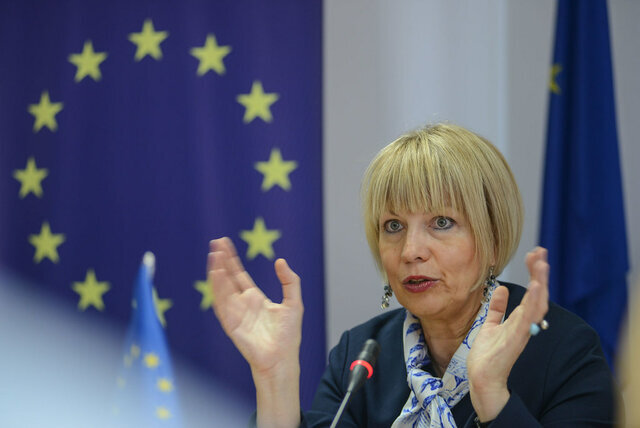EU: Nuclear commitments and lifting sanctions are essential parts of JCPOA

Helga Schmid, secretary general of the European External Action Service (EEAS), issued a statement on Sunday saying that participants at the emergency meeting of the JCPOA in Vienna reaffirmed their commitments to preserve the JCPOA.
According to the JCPOA, the official name for the 2015 nuclear agreement, Iran is obliged to put limits on its nuclear activities in exchange for termination of economic and financial sanctions.
“Participants reaffirmed their continued commitment to preserving the JCPOA. They recalled that both nuclear commitments and sanctions-lifting are essential parts of the agreement,” reads the statement.
Following is full text of the statement published on the official website of the European Union:
An extraordinary meeting of the Joint Commission of the Joint Comprehensive Plan of Action (JCPOA) took place in Vienna on 28 July 2019 upon the request of France, Germany, the United Kingdom and the Islamic Republic of Iran. The meeting was held in order to discuss the need regarding the full and effective implementation of the JCPOA in all its aspects.
The Joint Commission was chaired, on behalf of EU High Representative Federica Mogherini, by EEAS Secretary General Helga-Maria Schmid and was attended by the E3+2 (China, France, Germany, Russia, United Kingdom) and Iran at the level of Political Directors/Deputy Foreign Ministers.
Under the terms of the JCPOA, the Joint Commission is responsible for overseeing the implementation of the nuclear deal.
Participants reaffirmed their continued commitment to preserving the JCPOA. They recalled that both nuclear commitments and sanctions-lifting are essential parts of the agreement. They also reiterated the commitments contained in chair’s statements issued after previous Joint Commissions and, in particular, to continue discussions at expert level on sanctions-lifting and nuclear issues.
Participants reaffirmed their strong support and collective responsibility for the nuclear projects (in particular Arak and Fordow) that are an essential part of the JCPOA in order to ensure the exclusively peaceful nature of Iran's nuclear program.
It was agreed that a meeting of the Joint Commission at ministerial level would be convened in the near future.
‘We will continue to reduce commitments until Europeans secure Iran’s interests’
Iranian Deputy Foreign Minister for Political Affairs Abbas Araghchi who represented Iran in the emergency meeting of the JCPOA told Reuters the talks were “constructive”.
“The atmosphere was constructive. Discussions were good. I cannot say that we resolved everything, I can say there are lots of commitments,” he said.
Representatives of the parties to the deal met in Vienna on Sunday for emergency talks called in response to Tehran's reduction of commitments of the accord.
“As we have said, we will continue to reduce our commitments to the deal until Europeans secure Iran’s interests under the deal,” Araghchi said after the meeting.
Iranian Foreign Ministry spokesman Abbas Mousavi said in a press conference on Monday that Araghchi delivered Iran’s message to French President Emmanuel Macron last week which offered plans which are still being studied.
Britain, France, Germany, Russia, China, and Iran have been trying to salvage the pact since the U.S. withdrew from it in May 2018 and re-imposed and toughened sanctions on Iran.
However, Europeans’ efforts to protect trade with Iran against the U.S. sanctions have yielded nothing concrete so far.
On May 8, exactly one year after the U.S. withdrew from the multi-nation nuclear agreement and reimposed sanctions on Iran, Tehran announced a partial withdrawal from some aspects of the pact, saying that the country would no longer adhere to some of the limits on its nuclear activities. It also threatened to step up uranium enrichment if an agreement is not made within 60 days to protect it from the sanctions’ effects.
In follow-up to that deadline, on July 7 Iran announced that it has started enriching uranium to a higher purity than the 3.67% as the Europeans missed the 60-day deadline to devise a concrete mechanism to protect the country from the U.S. sanctions.
In a press conference on Monday, Foreign Ministry spokesman Abbas Mousavi confirmed that if the EU fails to respond to Iran’s demands Tehran will take the next step in reducing nuclear commitments.
In a meeting with Song Tao, head of the International Department of the Central Committee of the Communist Party of China (CPC) in Tehran on Monday, First Vice President Es’haq Jahangiri said Iran’s decision to reduce nuclear commitments are primarily intended to salvage the JCPOA.
Iran has said its decision to reduce nuclear commitments are based on paragraph 36 of the JCPOA.
Paragraph 36 provided a mechanism to resolve disputes and allows one side, under certain circumstances, to stop complying with the deal if the other side is out of compliance.
NA/PA
Leave a Comment